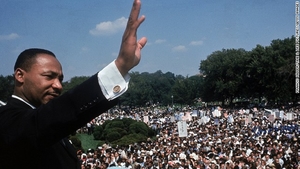On this day fifty years ago, America witnessed the largest public manifestation for the dignity of mankind it had ever seen. The March on Washington for Jobs and Freedom, led by The Rev. Martin Luther King, Jr. saw 250,000 people descend on the Mall in front of the Lincoln Memorial. Black and white, men and women, old and young, all faiths and all creeds.
On that day we heard Dr. King deliver what is arguably the greatest piece of oratory in the English language. "I have a dream!" he thundered. And we all dreamt the same dream. No one - even if they were a child - who saw or heard it was left unmoved or unchanged. The words and the spirit swept us up on gossamer wings.
 But on that day, it was not just a dream. Hope lived that day. We knew it could be a reality. We knew there were leaders of courage and conviction who could make it so. Leaders who understood the fierce urgency that “Justice shall roll down like waters and righteousness as a mighty stream.” Leaders who were not interested in balancing interests, but in challenging them.
But on that day, it was not just a dream. Hope lived that day. We knew it could be a reality. We knew there were leaders of courage and conviction who could make it so. Leaders who understood the fierce urgency that “Justice shall roll down like waters and righteousness as a mighty stream.” Leaders who were not interested in balancing interests, but in challenging them.
Yes, Medgar Evers had been tragically murdered in front of his wife and children just three months earlier. But there was still JFK and Bobby and above all Martin. Within 57 months they were all slaughtered. Many of us who came to political maturity in the late 60s and early 70s knew that the best people we would ever see in public life had already had their heads blown off. But on that day, everything seemed possible.
Remembering that day reminds us of a time when leaders of conscience and character marched across the land listening to a different drumbeat. They taught us how to fight against the tyranny of hypocrisy and mendacity. Their example gave many of us the courage to pledge undying vigilance against the viruses of interposition and nullification.
Looking back over the past half-century it is almost as if we have lived through a generational malaise of political mindlessness and mediocrity. That the dream of that day, a dream of unlimited expansion of individual purpose and possibility, had been replaced with an era of prohibition and pettiness. As if after the assasinations, leaders were too scared to lead.
But in our memory and witness on this day we keep the flame of hope alive. A hope that helps us keep our eyes on the prize. The prize of a society where, in King's words, "people will be judged by "the content of their character." The prize of a society that recognizes "the fierce urgency of now" so that there will not be an epitaph written "Over the bleached bones and jumbled residues of our civilization those pathetic words 'too late'."
We would do well today to reflect on that day day in Washington. Look at the speeches again. Show them to your children. Give them the example to lead. For we live in a time that reminds us of those historical encounters between governors and governed, when every act of the authorities exasperates our disgust and every refusal to act excites our contempt. Let them see that once there was a time when we would not let justice be compromised by timidity or honor be cheapened through expediency or promise be mortgaged to avarice.
The possibilities of our capacitiies for greatness and generosity are constantly compromised by an ungracious modernity and a suffocating self-absorption filled with false pieties as excuses for inaction. But it does not have to be this way.
Last Saturday in Washington, 92-year old Rev. Joseph C. Lowery, co-founder of the Southern Christian Leadership Conference with Rev. King, said, "Today we commemorate. Tomorrow we agitate!" That is the dream that must be kept alive. Witness and memory must always be followed by redemptive action. And by our deeds, the glorious hope of that brilliant summer day shall never die.

























Comments
Please login to post comments.